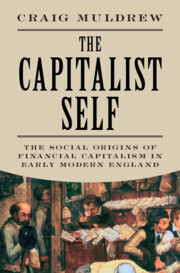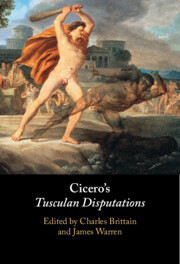Refine search
Actions for selected content:
193 results
Chapter 6 - Ethics in Plotinus and His Successors
- from Part II - Ethics
-
- Book:
- The Ladder of the Sciences in Late Antique Platonism
- Published online:
- 08 December 2025
- Print publication:
- 08 January 2026, pp 77-97
-
- Chapter
- Export citation
Introduction
-
- Book:
- The Joy of Love in the Middle Ages
- Published online:
- 20 November 2025
- Print publication:
- 04 December 2025, pp 1-14
-
- Chapter
- Export citation
Chapter 7 - Bentham
- from Part III - Sources of Naturalistic Utilitarianism
-
- Book:
- Modern Moral Philosophy in the Nineteenth Century
- Published online:
- 15 November 2025
- Print publication:
- 30 October 2025, pp 209-221
-
- Chapter
- Export citation
Chapter 8 - Mill
- from Part III - Sources of Naturalistic Utilitarianism
-
- Book:
- Modern Moral Philosophy in the Nineteenth Century
- Published online:
- 15 November 2025
- Print publication:
- 30 October 2025, pp 222-238
-
- Chapter
- Export citation
6 - Practical Ethics, the Self, and the Economy in an Era of Religious Dissent
-
- Book:
- The Capitalist Self
- Published online:
- 12 October 2025
- Print publication:
- 30 October 2025, pp 226-278
-
- Chapter
- Export citation
Chapter 6 - Early Modern Prologue
- from Part III - Sources of Naturalistic Utilitarianism
-
- Book:
- Modern Moral Philosophy in the Nineteenth Century
- Published online:
- 15 November 2025
- Print publication:
- 30 October 2025, pp 191-208
-
- Chapter
- Export citation
5 - An Ethical Fulcrum: From Participation in the Body of Christ to the Happy Self
-
- Book:
- The Capitalist Self
- Published online:
- 12 October 2025
- Print publication:
- 30 October 2025, pp 197-225
-
- Chapter
- Export citation
Can I get a little less life satisfaction, please?
-
- Journal:
- Economics & Philosophy , First View
- Published online by Cambridge University Press:
- 23 October 2025, pp. 1-22
-
- Article
-
- You have access
- Open access
- HTML
- Export citation

The Capitalist Self
- The Social Origins of Financial Capitalism in Early Modern England
-
- Published online:
- 12 October 2025
- Print publication:
- 30 October 2025
Chapter 9 - Tusculan Disputations 5
-
-
- Book:
- Cicero's <i>Tusculan Disputations</i>
- Published online:
- 11 September 2025
- Print publication:
- 18 September 2025, pp 163-188
-
- Chapter
- Export citation
Chapter 6 - Resisting the Blows of Fortune
-
-
- Book:
- Cicero's <i>Tusculan Disputations</i>
- Published online:
- 11 September 2025
- Print publication:
- 18 September 2025, pp 102-120
-
- Chapter
- Export citation

Cicero's Tusculan Disputations
-
- Published online:
- 11 September 2025
- Print publication:
- 18 September 2025
Chapter 2 - The Heart of Happiness
- from Part I - Aquinas on Individual Happiness
-
- Book:
- Aquinas and the Ethics of Happiness
- Published online:
- 07 August 2025
- Print publication:
- 21 August 2025, pp 37-59
-
- Chapter
- Export citation
Introduction
-
- Book:
- Aquinas and the Ethics of Happiness
- Published online:
- 07 August 2025
- Print publication:
- 21 August 2025, pp 1-16
-
- Chapter
- Export citation
Chapter 4 - Natural Imperfect Happiness
- from Part I - Aquinas on Individual Happiness
-
- Book:
- Aquinas and the Ethics of Happiness
- Published online:
- 07 August 2025
- Print publication:
- 21 August 2025, pp 97-122
-
- Chapter
- Export citation
Conclusion
- from Part II - Aquinas, Happiness, and the Unity of Ethics
-
- Book:
- Aquinas and the Ethics of Happiness
- Published online:
- 07 August 2025
- Print publication:
- 21 August 2025, pp 258-273
-
- Chapter
- Export citation
Chapter 1 - Three Kinds of Perfectionism
- from Part I - Aquinas on Individual Happiness
-
- Book:
- Aquinas and the Ethics of Happiness
- Published online:
- 07 August 2025
- Print publication:
- 21 August 2025, pp 19-36
-
- Chapter
- Export citation
Chapter 5 - Graced Imperfect Happiness
- from Part I - Aquinas on Individual Happiness
-
- Book:
- Aquinas and the Ethics of Happiness
- Published online:
- 07 August 2025
- Print publication:
- 21 August 2025, pp 123-150
-
- Chapter
- Export citation
Chapter 8 - Happiness and Virtue
- from Part II - Aquinas, Happiness, and the Unity of Ethics
-
- Book:
- Aquinas and the Ethics of Happiness
- Published online:
- 07 August 2025
- Print publication:
- 21 August 2025, pp 222-257
-
- Chapter
- Export citation
Chapter 7 - Happiness and Law
- from Part II - Aquinas, Happiness, and the Unity of Ethics
-
- Book:
- Aquinas and the Ethics of Happiness
- Published online:
- 07 August 2025
- Print publication:
- 21 August 2025, pp 182-221
-
- Chapter
- Export citation
